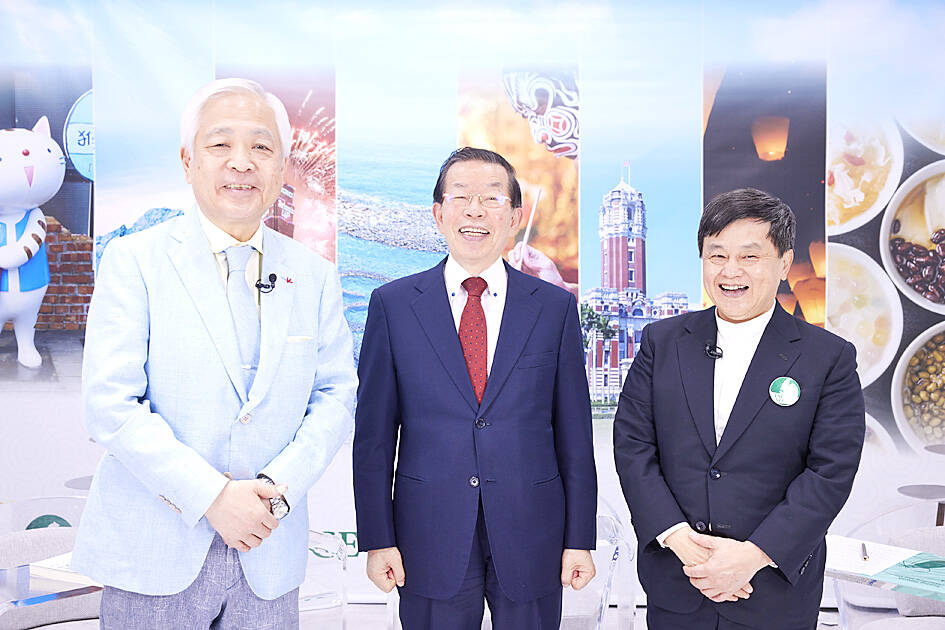Taiwan and Japan are of a “community of peace,” Representative to Japan Frank Hsieh (謝長廷) said in a television interview in Tokyo on Wednesday, while suggesting that Japan should play a more active role in maintaining world peace.
“We often say that Taiwan and Japan are of the community of common destiny, but the two countries are of a ‘community of peace,’” Hsieh told Taiwan Voice program hosts Yanki Fujii and Lin Jian-liang (林建良).
“Aside from bolstering defense capabilities, Japan cannot give up on peace,” he added.

Photo Courtesy of Taiwan Voice
Lin, a physician and an expatriate living in Japan, has for many years been dedicated to Taiwan’s democratic development and independence, while Fujii is an expert on Taiwanese issues.
Both have advocated Taiwanese sovereignty in print and online publications.
Hsieh spent the first half of the two-hour interview discussing how his studies at Kyoto University, a school known for a rebellious spirit, inspired his devotion to democratic movements in Taiwan.
This led to him becoming a defense lawyer for the accused in the Formosa Incident on Dec. 10, 1979, and his cofounding of the Democratic Progressive Party, Hsieh said.
“China has been saying that Taiwan is its core interest, but peace is actually the core interest of the international community,” Hsieh said. “Communism is a power without love, while peace is a power with love.”
Japan having experienced the only two atomic bombs used during wartime — at the end of World War II — led to a constitution based on pacifism, Hsieh said.
As such, the country is most qualified to play a leading role in preserving world peace, he said.
As Japan is likely to become a permanent member of the UN Security Council, many nations in East and Southeast Asia hope that Tokyo can be a leader in maintaining regional peace, he said, adding that the country should feel confident about assuming such a role.
While Japanese Prime Minister Fumio Kishida said that no unilateral changes to the “status quo” across the Taiwan Strait should be allowed, Hsieh said that those protecting peace need to be united to impose international sanctions on countries or individuals who challenge the principle.
Only by doing so can power be shown, he said.
“Peace without power and without actions is only a statement, and pacifism without might is a tragedy,” Hsieh said.
Japan, China, South Korea, Taiwan and Singapore enjoy economic prosperity because of peace, and any disruption to that peace is absolutely unacceptable, he added.
“I hope that that Prime Minister Kishida practices what he preaches, or it would be nothing but words,” he said.
Relations between Taiwan and Japan are a rare example of peace in Asia and should serve as a model to the world, he said.

Taiwanese can file complaints with the Tourism Administration to report travel agencies if their activities caused termination of a person’s citizenship, Mainland Affairs Council Minister Chiu Chui-cheng (邱垂正) said yesterday, after a podcaster highlighted a case in which a person’s citizenship was canceled for receiving a single-use Chinese passport to enter Russia. The council is aware of incidents in which people who signed up through Chinese travel agencies for tours of Russia were told they could obtain Russian visas and fast-track border clearance, Chiu told reporters on the sidelines of an event in Taipei. However, the travel agencies actually applied

Japanese footwear brand Onitsuka Tiger today issued a public apology and said it has suspended an employee amid allegations that the staff member discriminated against a Vietnamese customer at its Taipei 101 store. Posting on the social media platform Threads yesterday, a user said that an employee at the store said that “those shoes are very expensive” when her friend, who is a migrant worker from Vietnam, asked for assistance. The employee then ignored her until she asked again, to which she replied: "We don't have a size 37." The post had amassed nearly 26,000 likes and 916 comments as of this

US President Donald Trump said "it’s up to" Chinese President Xi Jinping (習近平) what China does on Taiwan, but that he would be "very unhappy" with a change in the "status quo," the New York Times said in an interview published yesterday. Xi "considers it to be a part of China, and that’s up to him what he’s going to be doing," Trump told the newspaper on Wednesday. "But I’ve expressed to him that I would be very unhappy if he did that, and I don’t think he’ll do that," he added. "I hope he doesn’t do that." Trump made the comments in

Tourism in Kenting fell to a historic low for the second consecutive year last year, impacting hotels and other local businesses that rely on a steady stream of domestic tourists, the latest data showed. A total of 2.139 million tourists visited Kenting last year, down slightly from 2.14 million in 2024, the data showed. The number of tourists who visited the national park on the Hengchun Peninsula peaked in 2015 at 8.37 million people. That number has been below 2.2 million for two years, although there was a spike in October last year due to multiple long weekends. The occupancy rate for hotels